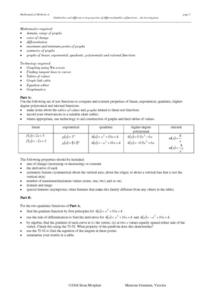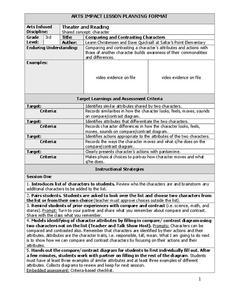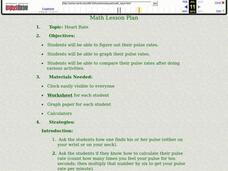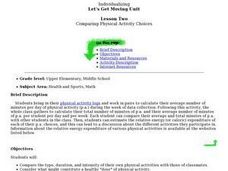Curated OER
Telling Time as an Everyday Use of Numbers
How can we estimate time? Have your young mathematicians make a clock. Then they compare and contrast types of clocks. They practice writing times in two different ways and make a book about telling time.
Curated OER
Funerals and Burial Rites
Ninth graders research burial practices that originated in West Africa and then migrated to the South Carolina and Ohio. They compare and contrast burial practices in both places. As students collect information and data, they organize...
Texas Instruments
Classifying Functions
Learners explore linear, quadratic, and exponential functions in this activity that makes use of TI Navigator and TI Plus calculators. Using the technology, learners compare and contrast the three types of functions given in the activity.
Curated OER
Similarities and Differences in Properties of Different Families of Functions - An Investigation
Exploring families of functions allows students compare and contrast properties of functions. Students discuss properties that include symmetry, max and min points, asymptotes, derivatives, etc.
Curated OER
Celsius or Fahrenheit?
Learners compare and contrast the two measurement scales of Fahrenheit and Celsius. They calculate the temperature using both measurements. Students demonstrate their comprehension of these systems by creating a dual-system thermometer...
Curated OER
Count on Chinese Characters
Students research and use traditional Chinese characters to notate numbers. They compare and contrast Chinese calligraphy with Arabic numerals. Students demonstrate their comprehension of number concepts through their drawings and...
Curated OER
Getting to Base 10
Students compare and contrast number systems from around the world. They study the decimal system to design and create their own base 10 sticks. Afterward, they use base 10 sticks to solve various addition and subtraction problems.
Curated OER
Mandala Geometry
Students compare and contrast symbols and images in traditional Buddist and Hindu mandalas and choose several symbols that have meaning to them. They assess the spiritual beliefs and representations in traditional creation of this art...
Curated OER
Mystery Map
Students compare and contrast varying approaches to present information, as they create a workable study guide. They create a Mystery Map with hidden words, facts, or hints to find treasures. Afterward, they interact and discuss...
Curated OER
Character Study
Third graders work in pairs to choose two characters and find their similarities and differences. For this character lesson, 3rd graders compare characters by their actions and attributes. Students individually complete a graphic...
Virginia Department of Education
Box-and-Whisker Plots
The teacher demonstrates how to use a graphing calculator to create box-and-whisker plots and identify critical points. Small groups then create their own plots and analyze them and finish by comparing different sets of data using box...
Armory Center for the Arts
Place Value Collage
How can art represent math? Use a lesson on place value collages to illustrate the different meanings that numbers have in their designated places. Kids observe photographs and paintings that show place value, then work on their own.
US Department of Commerce
Looking at Numbers of Births Using a Line Graph
Was there a baby boom? Using census data, class members take a look at the number of 8-11 year olds and determine their birth years. Scholars create a double line graph to compare the number of births for two states for several years....
Virginia Department of Education
Exponents
Expand your knowledge of exponents with an activity that promotes critical thinking and comparison skills. Middle and high schoolers compare numbers written in expanded and exponential form and explain their strategies for solving...
Virginia Department of Education
Analyzing and Interpreting Statistics
Use measures of variance to compare and analyze data sets. Pupils match histograms of data sets to their respective statistical measures. They then use calculated statistics to further analyze groups of data and use the results to make...
August House
The Pig Who Went Home on Sunday
Turn your classroom into a pig sty with a instructional activity based on the Appalachian folktale The Pig Who Went Home on Sunday. Similar to the story of The Three Little Pigs, the folktale tells a story of four pigs who leave home—and...
Curated OER
George and Sam Save for a Present
Third graders develop their algebraic thinking by recognizing a variety of patterns using concrete objects, numbers, tables, and pictures. In this George and Sam Save for a present lesson, 3rd graders communicate their mathematical...
Curated OER
Algebra: What's My Rule?
Students apply higher level thinking skills to determine rules for sorting and classification. In this pre-algebra instructional activity, students nominate classmates who they think satisfy the unspoken "rule" established by the leader....
Curated OER
Similar Solids
In this similar solids instructional activity, 10th graders solve 10 different problems that include comparing the volumes of similar solids. First, they determine the volume of a cube given its sides. Then, students determine what will...
Curated OER
Graphing Heart Rates
Students take their pulse rates. In this graphing lesson, students take their pulse rates and graph them. Students do various physical activities and graph the differences in their pulse rates.
Math Mammoth
Add & Subtract Whole Hundreds 1
In this mathematics worksheet, 3rd graders compare the problem 2700 plus 200 to the problem 27 plus 2 and explain their reasoning. Then they notice the patterns for each of the problems and continue them.
Curated OER
Study Guide: Rational Numbers
In this rational numbers worksheet, students solve and complete 8 different problems that include applying the comparison property and density property for rational numbers. First, they replace each blank with the correct symbol to make...
Curated OER
Comparing Physical Activity Choices
A physical activity log will help your elementary students keep track of their activities. Your class will calculate the average number of physicaly active minutes per day. They compare with other students and then estimate the relative...
Curated OER
Order Numbers On a Number Line
Fifth and sixth graders study the use of a number line to add integers and they observe a teacher demonstration of how to add integers on a number line. Afterward, they construct a number line and use the number line to solve addition...

























